Starting an online store allows you to expand your reach and boost sales. However, selecting the right eCommerce platform can be challenging due to the multitude of options available. Two notable platforms are Big Cartel and Shopify. This article provides a detailed comparison of Big Cartel vs. Shopify to assist you in determining the most suitable platform for your eCommerce needs.
At a Glance: Big Cartel vs. Shopify
Big Cartel and Shopify are cloud-based eCommerce platforms, meaning they operate online and require no software installation on your computer.
Big Cartel is especially appealing to artists because of its accessible and affordable plans and doesn’t charge transaction fees. It enables users to create attractive, professional online stores without coding effortlessly.
On the other hand, Shopify allows for the development of comprehensive eCommerce sites. It offers a range of plans tailored to different business sizes and needs. While Shopify is generally more costly than Big Cartel, it provides extensive customization options, additional features, and access to various apps.
Both platforms enable users to manage their stores remotely from any location with internet access and a web browser. Key functionalities of both Big Cartel and Shopify include:
- Online product sales
- Customer payment processing
- Global shipping of products
- Capability to sell in brick-and-mortar locations
Both platforms excel at performing these essential eCommerce functions.
An Overview of Big Cartel
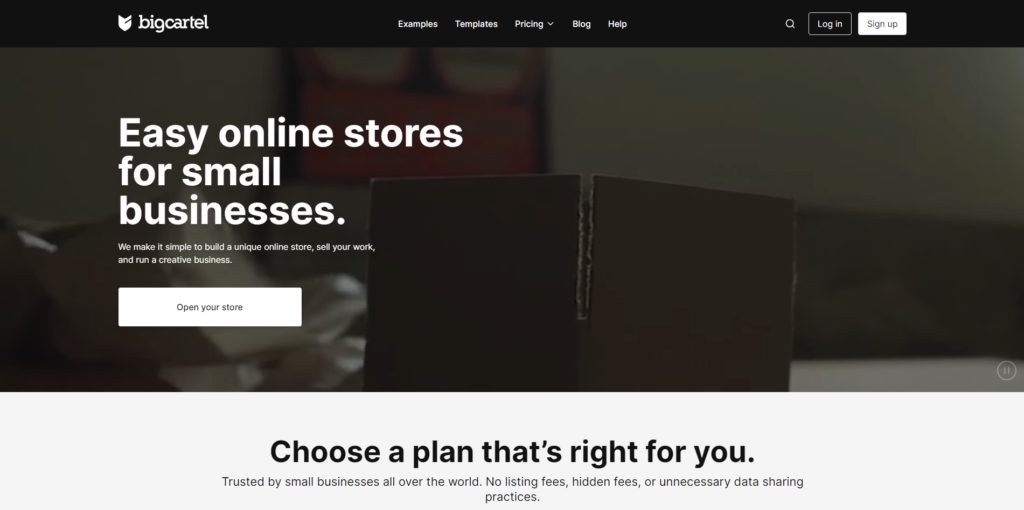
Image source
Big Cartel, a cloud-based eCommerce platform, allows you to create and manage your online store from any internet-connected device. It offers free themes to enhance your store’s appeal or provides an API for custom design, reflecting its artistic roots. Founded in 2005 by musician Matt Wigham, Big Cartel started as a means for his band to sell their merchandise online.
Designed by artists for artists, Big Cartel is ideal for selling handmade and custom items like clothing and jewelry. The platform offers a range of free and paid plans tailored to the scale of your operations, including the number of products you wish to sell and the features you need.
Big Cartel is often regarded as a “light” eCommerce solution, focusing on simplicity and ease of use. According to its website, it provides a balanced mix of features, including real-time analytics, order management, SEO, and marketing tools, making it straightforward to establish and maintain a small online store with minimal fuss.
Recent data from Builtwith.com shows that Big Cartel has facilitated over $2.5 billion in sales and supports over 78,000 online stores. Research indicates a 25% growth in its user base from the first quarter of 2021 to the first quarter of 2022.
Pros and Cons of Big Cartel
Pros
- Affordable pricing across all plans
- Free access to all templatesUser-friendly dashboard
- Capability to sell both online and in-person
- Custom domains available with paid plans
- Mobile applications for both iOS and Android
Cons
- The highest plan limits to 500 products
- Fewer features compared to other e-commerce platforms
- Limited customer support options
An Overview of Shopify
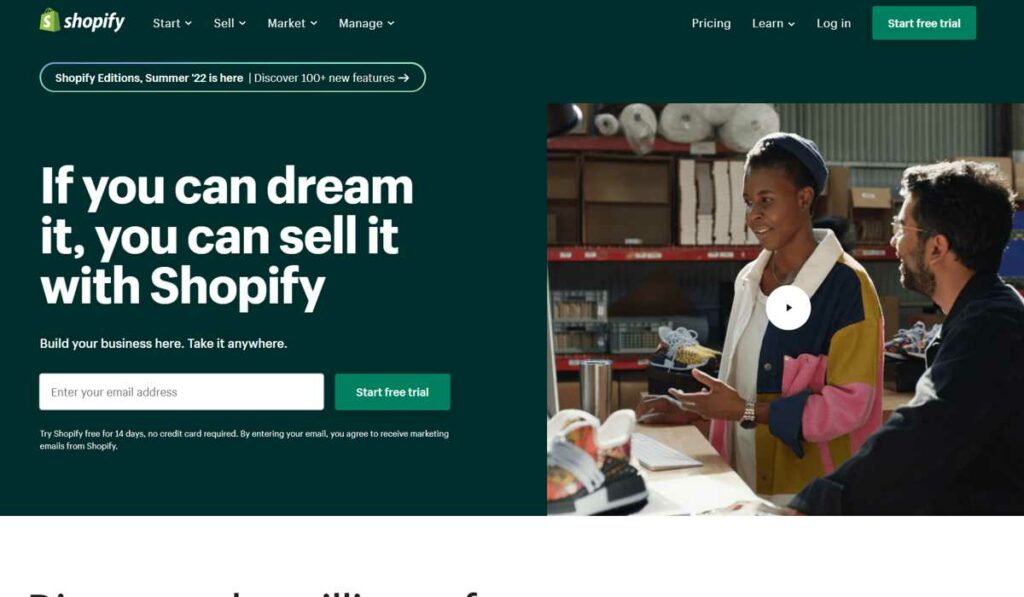
Image source
Shopify is a fully hosted, cloud-based eCommerce platform primarily designed for small businesses, direct-to-consumer (DTC) operations, and small to medium enterprises (SMEs). It provides an all-inclusive online business starter kit that lets anyone start selling online easily and securely. By the first half of 2023, Shopify expanded its offerings to include more features for larger businesses, incorporating B2B, wholesale, and enterprise functionalities. Over 14,000 major brands globally rely on Shopify Plus, their enterprise solution, for their business needs.
Essentially, Shopify offers a user-friendly online platform that allows users to quickly create their own website to sell products without needing any coding skills. While small business owners may traditionally need time to hire graphic designers or learn design software, Shopify simplifies this process. It eliminates the need for software installation or separate hosting services, providing all the essential tools for online store success.
Shopify’s impact is significant. It has facilitated over $886 billion in sales, vastly exceeding Big Cartel’s sales. The platform is used by millions of merchants, with approximately 4.6 million active online stores currently running on Shopify.
Pros and Cons of Shopify
Pros
- User-friendly interface
- Scalable for growing businesses
- Robust security measures
- Wide variety of theme options
- Extensive selection of third-party apps
- Round-the-clock customer support
Cons
- Costs can increase with third-party payment gateways
- Design modifications may need developer help
- A limited number of free themes (only 12)
Big Cartel vs Shopify: User Experience
Setting up a store on Big Cartel is straightforward and user-friendly. Upload your product images, set your prices, choose a suitable theme, and you’re ready to start selling. The user interface is minimalistic and easy to navigate, making it ideal for beginners and startups. Big Cartel’s Help section provides detailed support if you encounter any issues.
On the other hand, Shopify is renowned for its user-friendliness despite being a complex, feature-rich platform. The setup process is streamlined into four simple steps: add your products, customize your theme, establish a domain, and configure your taxes and shipping details. Shopify also offers a responsive theme editor, allowing you to fine-tune the appearance of your store before it goes live, ensuring a smooth and efficient store launch.
Big Cartel is generally easier to use than Shopify. Its onboarding process is user-friendly, featuring helpful prompts and reminders that guide users through each step of setting up a store. On the other hand, while offering a more comprehensive eCommerce solution, Shopify can be more complex and demanding to set up due to its extensive features and capabilities.
Big Cartel vs Shopify: Templates and Customization
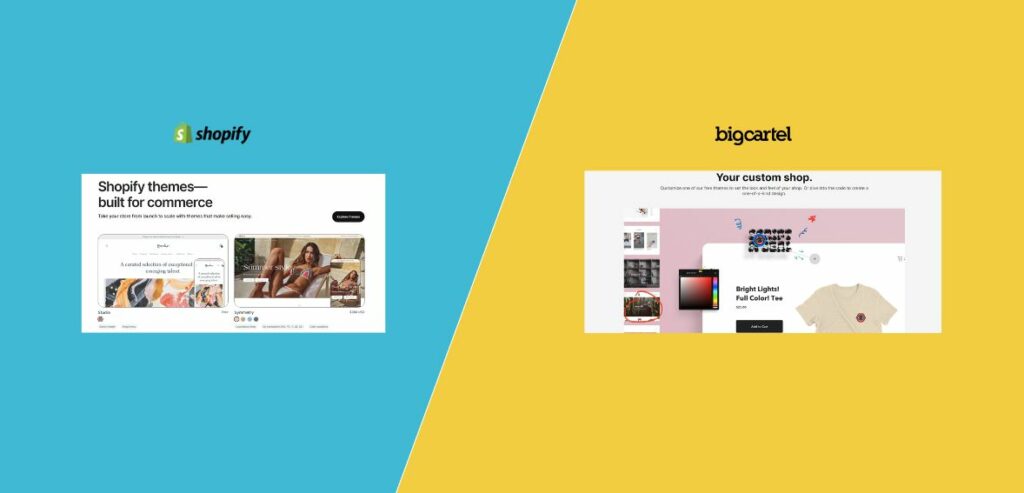
Big Cartel provides more basic designs with 17 free templates that are also mobile-friendly. However, it lacks mobile-specific editing and customization features. While user-friendly, Big Cartel’s templates do not support features like product image zoom and customer logins, which can enhance the overall shopping experience. Customizing a Big Cartel theme can be more challenging and may require coding skills, which could be a barrier if you’re uncomfortable with programming.
However, Shopify stands out in design, offering a different and amazing selection of themes. There are 12 free options among over 170+ paid ones, ranging from $140 to over $400. All themes are optimized for mobile use, ensuring your store looks great on any device, and you can maintain consistent styling across mobile and desktop versions. These themes are modern and professional and offer high levels of customization.
While Shopify offers a range of customizable themes that can effectively reflect your brand’s identity, Big Cartel offers simpler options and has limitations regarding essential features and customization possibilities. Advanced customization on both platforms might require some coding knowledge.
Big Cartel vs Shopify: eCommerce Features Overview
eCommerce has become an essential channel for businesses to reach customers and sell products online. Maintaining a strong online presence and delivering a smooth shopping experience are crucial as online shopping continues to grow.
Here’s what Big Cartel and Shopify eCommerce platforms offer to meet these needs.
Big Cartel’s eCommerce Capabilities
- Inventory Management: Inventory tracking in your eCommerce store helps monitor stock levels and sold-out items. You’ll also receive alerts when stock is low on particular products.
- Analytics: The dashboard enables tracking orders, visitor statistics, and conversion rates. With a paid plan, you can integrate Google Analytics to gain detailed insights into your store’s customer demographics, locations, and purchasing preferences.
- Multiple Product Images: If you subscribe to a paid plan, you can upload up to five images for each product you list. Only one image per product is allowed for those on a free plan.
- Custom Domain: Free plans use a “shop.bigcartel.com” URL, while paid plans allow using a custom domain registered via Google Domains. A custom domain improves your store’s visibility and enhances SEO.
- Apply Discounts: Paid plans enable you to offer discount codes that customers can use at checkout to receive a fixed discount or a percentage off the product’s price.
- HTML/CSS Editor: The paid plans allow you to edit your store’s HTML and CSS.
- Order Management: Using the Big Cartel dashboard, post-purchase features include sending confirmation emails to customers, tracking orders, exporting order history in bulk via CSV file, and printing shipping labels.
- Payment Processing: Supports convenient payment options through PayPal and Stripe for easy customer transactions.
Shopify’s eCommerce Capabilities
- Storefront Themes & Customization: Shopify boasts a vast selection of over 70 professional and attractive themes in its Theme Store, all mobile responsive and easily customizable.
- Abandoned Cart Recovery: All Shopify plans include abandoned cart recovery features, which prompt customers who have left items in their carts to return and complete their purchases.
- Shipping Discounts: Shopify plans offer competitive shipping rates, including discounts of up to 88% from major carriers like DHL Express, USPS, and UPS.
- Sell Online or In-Person: You can sell products online through your Shopify store, social media channels, blogs, or online marketplaces, or in-person at retail stores, pop-ups, or markets using Shopify POS.
- Store Management: Shopify provides tools to understand customers’ shopping habits better. Options like guest checkout or account creation at checkout encourage repeat business. Administrators can organize and export customer lists based on criteria such as purchase history and location.
- Product & Inventory Management: Shopify supports adding unlimited products to your online store and allows for variations like SKU, size, weight, and price. Administrators can upload multiple images per product and manage inventory, including tracking stock counts via the backend panel. Products can be imported or exported using CSV files.
- Payment Options: To cater to a broad customer base, it supports diverse payment methods, including credit cards, PayPal, and Apple Pay.
Big Cartel vs Shopify: App Integration
Integrating apps greatly expands the potential of your online store. Big Cartel and Shopify allow you to install apps to enhance your business’s marketing, SEO, and shipping processes. The two systems’ levels of integration differ in terms of ease of use and extent.
Big Cartel’s premium plugin, Zapier, enables connectivity with over 7,000 third-party apps. However, it is still possible to directly link about 25 software tools (such as MailChimp, Facebook Store, ShipRobot, and Instagram) without the need for Zapier. These integrations can greatly enhance your store’s marketing, administration, and shipping capacities. It is crucial to remember that some of the capabilities offered by these add-ons could have a minor monthly cost.
Shopify’s App Store is a key feature that contributes to its popularity, offering over 8,000 app integrations that cover virtually every aspect of web-based business operations. This enables you to improve the functionality of your store in customer care, SEO, design, management, productivity, security, reporting, and sales channels. However, the cost can increase because most integrations come with an extra monthly subscription. To prevent unpleasant shocks, prospective Shopify users should budget for these expenses. The range of features provided by Shopify’s apps frequently makes the prices reasonable.
Unlike Big Cartel, Shopify has a wider variety of app connections and does not require other installation tools. Because of this, Shopify is the more reliable option for companies looking for all-inclusive eCommerce solutions and substantial app support.
Shopify’s App Store provides various options across various categories, offering extensive flexibility and functionality. Conversely, while Big Cartel allows integration with third-party apps, its direct app offerings are relatively limited. Users should carefully evaluate app ratings and costs when choosing apps for their eCommerce platform to ensure they select the best tools for their needs.
Big Cartel vs Shopify: Marketing and SEO Capabilities
Big Cartel provides essential marketing and SEO features suitable for getting started. You can edit title tags and meta descriptions, but the platform does not include a built-in blogging feature. This implies that you must integrate an external blog if you want to utilize content marketing for SEO purposes. While Big Cartel handles the basics well, the platform’s simplicity means it doesn’t offer some of the more advanced SEO features.
However, Shopify’s advanced marketing and SEO tools offer a significant advantage for businesses aiming to expand their reach. Shopify is more than just an e-commerce platform; it helps you construct your website from the ground up and enhances your ability to market products online. It includes built-in tools designed to optimize product listings and improve their search engine rankings. For instance, Shopify can automate the creation of product descriptions or manage redirects for updated website pages.
Additionally, the Shopify App Store expands your capabilities further by offering integration with third-party and Shopify-specific apps. These tools can be pivotal for scaling your business, allowing you to conduct product research to discover trending items based on customer demand. They also provide keyword research tools, a title builder for optimized listings, competitor analysis, and more sophisticated SEO features. Exploring both the Shopify App Store and external tools is crucial to fully leverage the potential of your Shopify store and enhance your online marketing strategy.
Shopify provides a more extensive suite of tools tailored for businesses where SEO and content creation are crucial elements of their marketing strategy and help drive organic traffic. On the other hand, Big Cartel might be suitable for those who require only basic tools and prefer a simpler approach to SEO.
Big Cartel vs Shopify: Sales Features
Setting up your online store marks the beginning of your sales journey. Shopify stands out with its comprehensive e-commerce sales features, making it a robust choice for many businesses. Features, like abandoned cart recovery, discount codes, and customizable checkout processes, are key advantages.
Shopify caters to businesses aiming for growth with unlimited products and bandwidth, promotional tools, discounts, and product recommendations. Additionally, it’s designed for scalability, accommodating businesses as they expand.
On the other hand, Big Cartel’s offerings are more tailored for small-scale operations or individual sellers. Although it lacks features like abandoned cart recovery—which has been shown to boost sales by 10% potentially—and offers limited sales channels, its simplicity can be a significant advantage. This straightforward approach particularly appeals to smaller businesses and independent artists who need an uncomplicated platform for online sales.
Plus, Shopify excels in multi-channel selling, integrating social media platforms (such as Facebook and Instagram), online marketplaces (like Amazon and eBay), and point-of-sale systems to enable in-person transactions. This extensive integration helps businesses reach customers across multiple shopping environments. While Big Cartel also supports social media promotions and other platform integrations, the options are somewhat more constrained.
Big Cartel vs Shopify: Payment Processing
A payment processor enables your online store to accept non-cash payments, which is essential for conducting business online. These processors can be integrated directly with your store’s software or non-integrated, requiring a separate login and functioning as a distinct entity.
Big Cartel utilizes non-integrated payment processors, meaning the payment processing is not directly embedded within the store’s system. Consequently, you will need to manage a separate payment processor and adhere to its credit card processing fees. Importantly, Big Cartel does not impose listing fees or take a percentage of your sales, allowing you to retain more revenue.
Whereas Shopify offers a fully integrated solution through Shopify Payments. This integration allows you to manage and view your payment data alongside other store analytics within a single platform and eliminates transaction fees when using Shopify Payments. If you choose to use an external payment processor with Shopify, be aware that you will incur transaction fees and any processing fees charged by the external processor.
Big Cartel vs Shopify: Pricing and Processing Fees
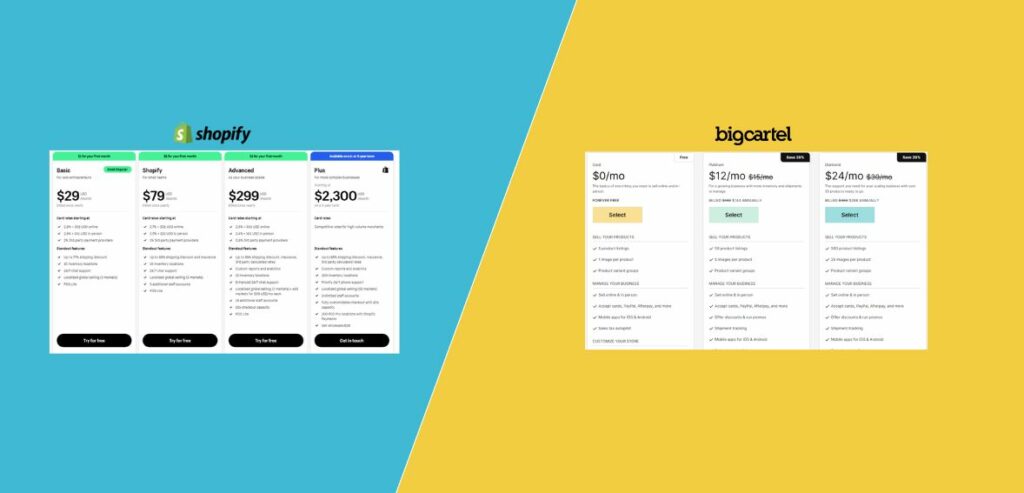
Pricing of Big Cartel
Big Cartel is ideal for users looking for a simple setup and with limited products to sell. The platform provides several pricing plans, including a free option, which makes it an attractive choice for beginners or those working within a tight budget.
The platform offers three pricing plans tailored to the size of your product list. All plans come with free customizable templates, access to real-time sales data, multiple payment options, and the flexibility to sell both online and in person. Features like setting up product variant groups and automating sales tax calculations are also included.
Here are the details of what each plan offers:
- Gold ($0/month): With this plan, you can sell up to five products with one image per product. Connecting to a custom domain (such as www.examplestore.com) is an option. If you do not already have a custom domain, use a free Big Cartel subdomain (such as examplestore.BigCartel.com). Basic extras like creating product variations and variants and having the capacity to run sales and promotions are also included in the plan.
- Platinum ($15/month): This mid-tier plan allows you to offer up to 50 products, each with up to five photos. Theme customization via CSS, inventory tracking, and Google Analytics connection are further capabilities.
- Diamond ($30/month): At the highest tier, Diamond, the product limit is raised to 500; However, five photos per product are still permitted. This plan, with its increased product capacity, expands upon the Platinum offers.
All paid plans on Big Cartel provide essentially the same functionalities, with the primary difference being the number of products you can list. Big Cartel does not operate its own payment processing system but supports transactions through Stripe and PayPal.
Merchants can also offer PayPal’s “buy now, pay later” service, Google Pay and Apple Pay for online payments, and Stripe’s mobile terminal for in-person payments. It’s important to note that Big Cartel does not impose any additional payment processing fees; instead, merchants are only responsible for the transaction fees charged by their selected payment processor.
For transactions using online debit and credit cards, Apple Pay, Google Pay, and Click to Pay, Stripe’s fee structure is 2.9% plus $0.30 per transaction. Payments processed via Stripe’s mobile terminal are subject to a slightly lower rate of 2.7% plus $0.05 per transaction. PayPal’s fees for online transactions range between 2.99% and 3.49%, with an additional $0.30 per transaction. However, PayPal’s pricing can vary depending on region and currency.
Pricing of Shopify
Shopify offers various plans to suit different business needs, each with specific features and monthly fees. The plans include Basic Shopify, Shopify Plan, Advanced Shopify, and a customizable enterprise plan available upon request.
- Basic Shopify ($29/month): With access to Shopify’s essential capabilities, you may create an online store and sell an infinite quantity of goods through practically any online sales channel with this subscription.
- Shopify ($79/month): With features like advanced reporting and POS upgrades—including register shifts and indefinite staff PINs for activity monitoring—the Shopify plan expands your potential.
- Advanced Shopify ($299/month): With every e-commerce capability offered by Shopify, this plan is ideal for companies expanding quickly. In addition to the services offered in the lower tiers, it offers an advanced report builder, calculates third-party shipping prices, and reduces rates on Shopify credit card payments.
Additionally, Shopify offers a lower-tiered option, the Shopify Starter plan at $5/month, which allows you to embed Buy Now buttons on existing website pages and create checkout links for social media channels. However, it’s important to note that this plan does not allow you to build a standalone store.
The fees per transaction vary according to Shopify’s plans. Under the Basic Plan, the online transaction fee is 2.9% plus $0.30, while the in-person transaction fee is slightly lower at 2.7%. If you are not using Shopify Payments, an additional fee of 2% is applied per transaction.
The Shopify Plan reduces these fees: The online transaction fee is 2.6% plus $0.30, and the in-person fee is 2.5%, with an additional fee of 1% for non-Shopify Payments transactions. The Advanced Plan offers the lowest transaction fees: 2.4% plus $0.30 for online and 2.4% for in-person transactions and an additional 0.5% for transactions not using Shopify Payments.
Big Cartel vs Shopify: Contracts and Cancellation Policies
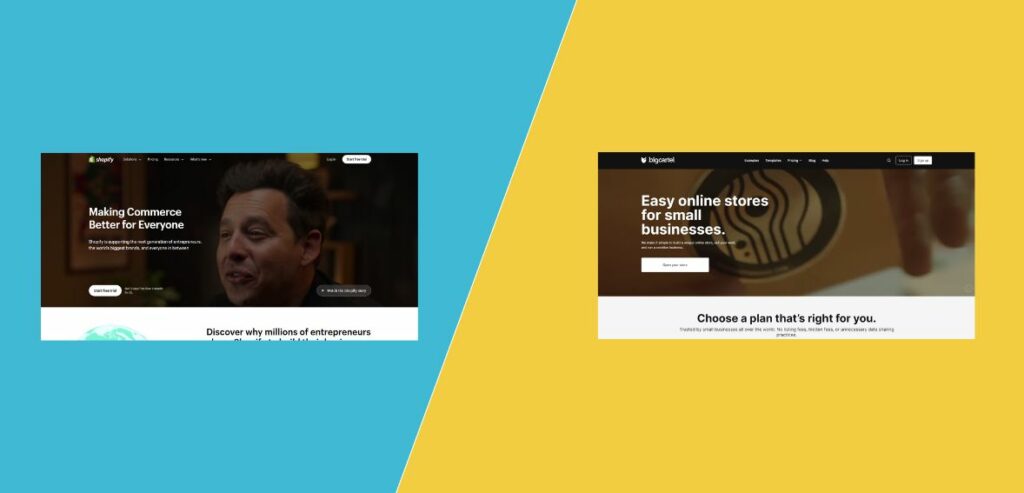
Big Cartel provides month-to-month plans with no long-term commitments, allowing you to cancel your subscription anytime.
Shopify offers flexibility with both month-to-month and annual contracts. Opting for an annual plan and paying upfront can provide you with up to 25% savings. If you need to close your Shopify store, you can deactivate your account and cancel the subscription; however, refunds are unavailable. Shopify also offers a “pause and build” option, which allows you to temporarily halt your store’s operations while still making backend adjustments.
Big Cartel vs Shopify: PCI Compliance
PCI compliance encompasses a set of security standards that online stores must follow to protect customer data. Big Cartel does not provide PCI compliance directly; instead, it requires its users to depend on external payment processors like PayPal and Stripe to ensure compliance.
On the other hand, Shopify ensures PCI compliance across the board, regardless of the payment processor used.
Big Cartel vs Shopify: Customer Support and Help
In the competition between Big Cartel and Shopify, Shopify excels notably in customer support, offering extensive 24/7 assistance tailored to businesses of all sizes, including small businesses. This commitment to support is a standout feature that differentiates Shopify from other ecommerce platforms.
Shopify provides specialized support for various marketing solutions and industries, with a team of experts ready to help enhance your ecommerce site with advanced features and solutions tailored to your specific needs.
Plus, Shopify’s around-the-clock customer support is available to offer technical help or swiftly address your questions through live chat, email, or phone. Their comprehensive help section is equipped with a wealth of resources, including articles, guides, and access to community forums, all designed to support Shopify store owners effectively.
What’s Better: Big Cartel or Shopify?
Let us settle the dispute between Big Cartel and Shopify. Which platform is the best in reality?
As we’ve seen, Big Cartel and Shopify cater to fundamentally various types of users with distinct needs. Big Cartel is designed for artists and small businesses that require a straightforward platform for selling a limited range of products. Shopify, meanwhile, is aimed at small to large companies that need a more dynamic and feature-rich selling environment.
Shopify offers a broader range of functionalities and greater flexibility, which makes it the stronger contender in the Big Cartel vs Shopify matchup. However, it’s important not to overlook the strengths of the Big Cartel.
Big Cartel remains an excellent choice for creatives such as artists and photographers. It is particularly beneficial for those looking for a cost-effective way to sell a few art pieces. The right choice depends on your specific business needs and goals.
Conclusion
When considering Big Cartel vs. Shopify for your e-commerce needs, it is crucial to weigh each platform’s unique features and offerings against your business requirements and budget constraints. With its artist-friendly roots and affordable pricing, Big Cartel is an excellent option for individuals or small businesses seeking a straightforward, budget-friendly solution. It caters well to creators and artisans looking to sell handmade or custom items, offering simplicity and ease of use without transaction fees. However, its limitations in features and scalability may not suit larger or rapidly growing businesses.
On the other hand, Shopify shines as a comprehensive e-commerce platform suitable for businesses of all sizes. With its robust features, extensive customization options, and scalable plans, Shopify empowers businesses to create professional online stores tailored to their unique needs. While it comes at a higher cost than Big Cartel, the investment may be worthwhile for businesses looking to scale and expand their operations.
Whether you value simplicity, affordability, or scalability, Big Cartel and Shopify offer useful solutions to help you start your e-commerce business and thrive in the cutthroat online marketplace. Ultimately, which platform is best for you will depend on your unique business goals, financial constraints, and level of technical expertise.
Frequently Asked Questions
What are Big Cartel and Shopify’s key differences in pricing and plans?
Big Cartel offers free and paid plans at $9.99 and $19.99 monthly, targeting small-scale operations with simplicity. Shopify’s plans range from $29 to $299 monthly, providing a broader range of features and scalability for various business sizes.
How do Big Cartel and Shopify differ in terms of design and customization?
Big Cartel features artist-oriented themes with limited customization, often requiring coding for extensive changes. Shopify offers a variety of easily customizable themes suitable for different business types, with no coding needed for basic adjustments.
Which platform offers better features for ecommerce and sales?
Shopify provides advanced ecommerce features, including unlimited products, abandoned cart recovery, and wide app integration, which is ideal for expanding businesses. Big Cartel focuses on creatives and artists with basic features for selling limited product quantities.
What are the differences in customer support between Big Cartel and Shopify?
Shopify offers extensive 24/7 support via live chat, email, and phone, ensuring accessibility for users. Big Cartel provides more limited support, mainly through email during standard business hours.

